For folks with sensitive skin, hunting down the perfect sunscreen can feel like a Herculean feat. The struggle to find a product that offers proper sun protection without any negative side effects (irritation, breakout, burnt, teary eyes from it dripping down your face) is very, very real. Unfortunately, many conventional SPFs contain ingredients like oxybenzone, fragrances, and preservatives that can trigger allergic reactions… no thanks! But fear not—the best sunscreens for sensitive skin do exist, you just need to know what to look for.
Here to guide you on your sensitive-skin-friendly-SPF journey are the people who know it best: professional dermatologists. Read on for what to look for in a quality sunscreen for sensitive skin straight from the experts, as well as 10 dermatologist-approved options to throw in your beach bag worry-free.
The best sunscreens for sensitive skin, at a glance:
- Best for face: Elta MD UV Clear Facial Sunscreen Broad-Spectrum SPF 46, $41
- Best moisturizing: Kinship Self Reflect Probiotic Moisturizing Sunscreen Zinc Oxide SPF 32, $28
- Best roll-on: Sun Bum Mineral SPF 50 Sunscreen Roll-On, $18
- Best for eczema: CeraVe 100% Mineral Sunscreen SPF 50, $14
- Best sheer: Drunk Elephant Umbra Sheer Physical Daily Defense Broad Spectrum Sunscreen SPF 30, $34
- Best drugstore: Neutrogena Sensitive Skin Mineral Sunscreen SPF 60+, $30
- Best for sports: Aveeno, Positively Mineral Sensitive Skin Sunscreen, $20
- Best with minimal white cast: CoTz Sensitive SPF 40 Broad Spectrum UVA-UVB, $28
- Best for pregnancy: TiZO3 Mineral Sunscreen and Primer SPF 40, $45
- Best for families: Blue Lizard Australian Sunscreen Sensitive SPF 30+, $15
What to look for in sunscreen if you have sensitive skin
Having sensitive skin means being extra cautious before applying anything to your skin, including sunscreen. That said, there are some general things to look for in UV protection to make your shopping journey easier:
Mineral-based formulas
If you have sensitive skin, you’re better off with mineral sunscreens. According to Purvisha Patel, MD, a board-certified dermatologist and founder of Visha Skincare, people with sensitive skin should opt for natural mineral sunscreens (those with zinc or titanium oxide as the photo-protective ingredient) over chemical sunscreens (which use chemical ingredients, like avobenzone or oxybenzone, to protect skin from UV-rays.
“These ingredients are safer for you as they stay on the surface of the skin and are not absorbed into the body, as chemical sunscreen ingredients are,” she explains. “Chemical sunscreens can be irritating to skin with an impaired barrier, such as in those with sensitive skin. They work by absorbing UV radiation, versus mineral blocks that deflect the light.”
Simple ingredients
As with most sensitive-skin-friendly cosmetics, the fewer ingredients in your sunscreen, the better. Avoid things like fragrances, oils, dyes, chemicals, and glitter (sorry—as fun as it is, it can upset your skin!). These free formulas reduce the risk of irritation and are less likely to cause allergic reactions.
A derm’s seal of approval
Finally, look for sunscreens that have been dermatologist-tested and recommended. These products undergo rigorous testing to ensure they are safe and effective for sensitive skin, giving you peace of mind when slathering it on at the beach or pool.
What to avoid
As to what to look out for, Dr. Patel says to steer clear of chemical UVf filters, specifically oxybenzone and para-aminobenzoic acid (PABA), a once-common sunscreen ingredient. Both of these chemicals are known to cause allergic reactions and are potential hormone disruptors. You’ll also want to avoid sunscreens containing fragrance, as they have the potential to irritate sensitive skin as well.
Ahead, find the best sunscreens for sensitive skin. Hot tip via Patel: Remember the shot glass rule when it comes to application. “Use two fingers for the face, a shot glass for the top half of the body and a shot glass for the lower body,” she says. For more sun protection options, check out our lists of editor-tested sunscreens and the best spray sunscreens for your face.
Shop 10 of the best sunscreens for sensitive skin
Ahead, find the best sunscreens for sensitive skin. Hot tip via Dr. Patel: Use the “shot glass rule” for proper application. “Use two fingers for the face, a shot glass (amount) for the top half of the body and a shot glass for the lower body,” she says.
This is a very popular, award-winning sunscreen that Dr. Patel (and many celebs like Hailey Bieber!) recommends. The primary filter—micronized zinc oxide—is blended with contains niacinamide, which can help fight breakouts and free radicals. Together, the two stave off damage from UVA and UVB rays, as well as dark spots, redness, and inflammation. It’s also fragrance-free, paraben-free, and oil-free, making it a great sunscreen for your face. The only downside is that it is a hybrid SPF, meaning it uses mineral *and* chemical filters to block out rays. Your best bet? Do a patch test first.
SPF level: 46
Type: Hybrid
Active ingredients: 9.0% zinc oxide, 7.5% octinoxate
Pros:
- Oil-, fragrance-, and dye-free
- Contains skin-supporting actives
- Sheer finish
- Dermatologist tested
Cons:
- Hybrid—contains chemical filter as well as mineral
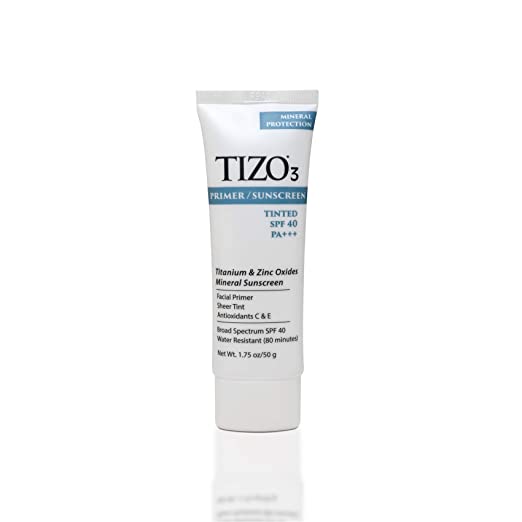
Another favorite of Patel’s, this matte, water-resistant sunscreen (which comes in both tinted and non-tinted options) is made with both titanium dioxide and zinc oxide, and is free from fragrances, essential oils, and preservatives. It’s dermatologist-recommended and also makes for a good pregnancy-safe sunscreen option.
SPF level: 40
Type: Mineral
Active ingredients: Titanium oxide, zinc oxide
Pros:
- Lightweight
- No dyes or fragrances
- Water-resistant for up to 80 minutes
Cons:
- Tinted version may not suit all skin tones
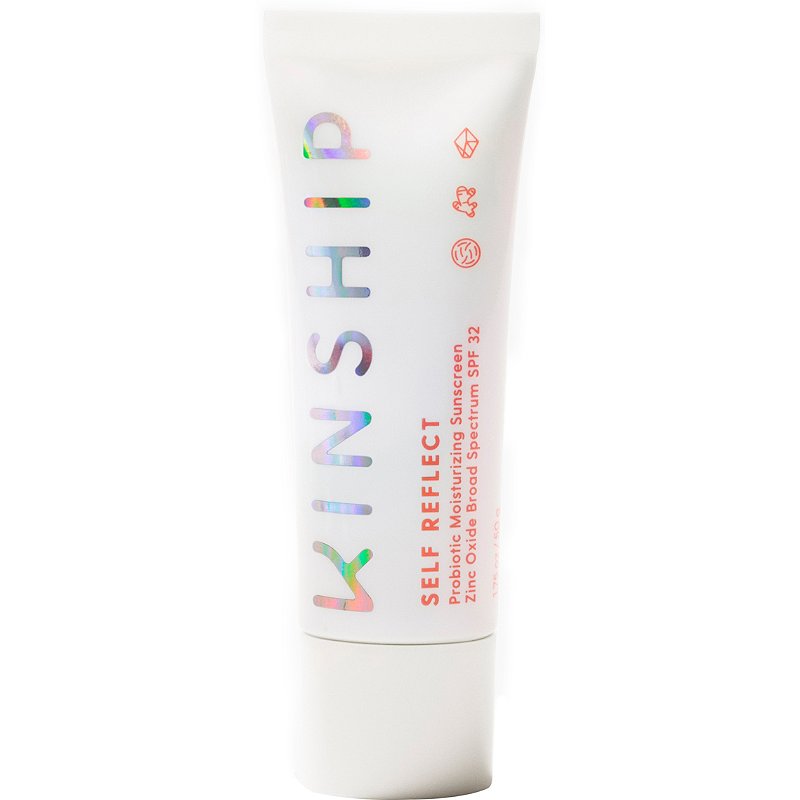
This easy-to-apply, chemical-free sunscreen goes on so smoothly, it almost acts like a primer underneath makeup. Not only does it contain zinc oxide as its main photo-protective ingredient, but it also has the antioxidant turmeric as well as the brand’s signature plant-based probiotic for even more protection. One thing to point out is that it does have a light vanilla scent (from natural vanilla extract), so if your skin can handle light fragrances this is a fun choice. Worth noting: there’s a sport version as well that’s sweat and water resistant up to 80 minutes.
SPF level: 32
Type: Mineral
Active ingredients: Zinc oxide
Pros:
- Can be used as a moisturizer, primer, and sunscreen
- Contains a probiotic
- Clean ingredients and no synthetic fragrances
Cons:
- Can leave skin feeling greasy
<!– –>
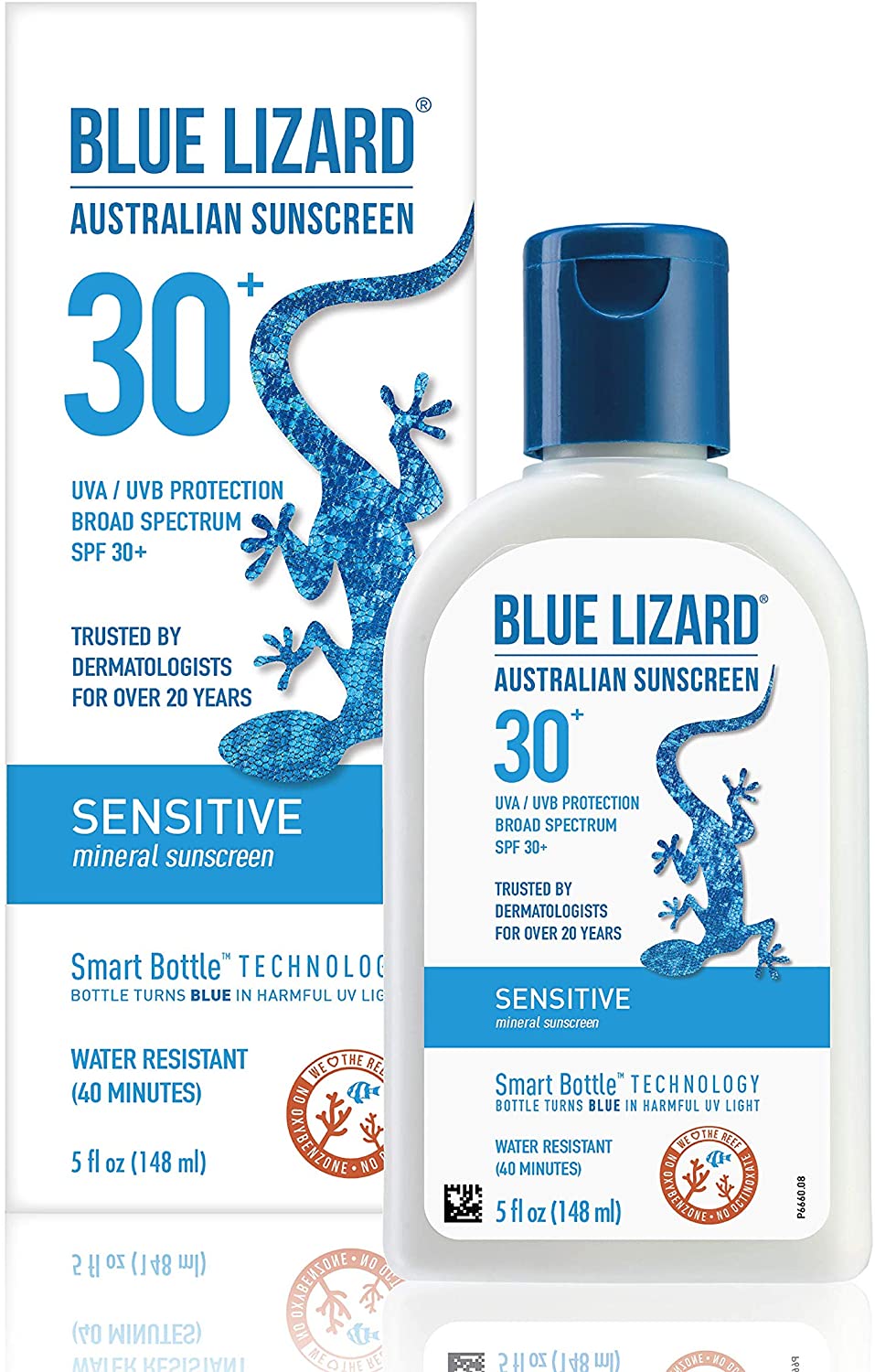
If you’re looking for a sensitive skin option that won’t break the bank, look no further than this chemical-free sunscreen from Blue Lizard. It’s water-resistant, so you can wear it in the pool without worry, and the bottle changes to blue when it’s exposed to the sun so you have a pretty cool reminder to apply it. There are no chemicals, fragrances, or parabens, and it’s safe to use even on kids.
SPF level: 30
Type: Mineral
Active ingredients: Zinc oxide
Pros:
- Easy to apply
- Water-resistant
- No fragrances, parabens, or chemical ingredients
Cons:
- Can be slightly greasy
- May leave a white cast
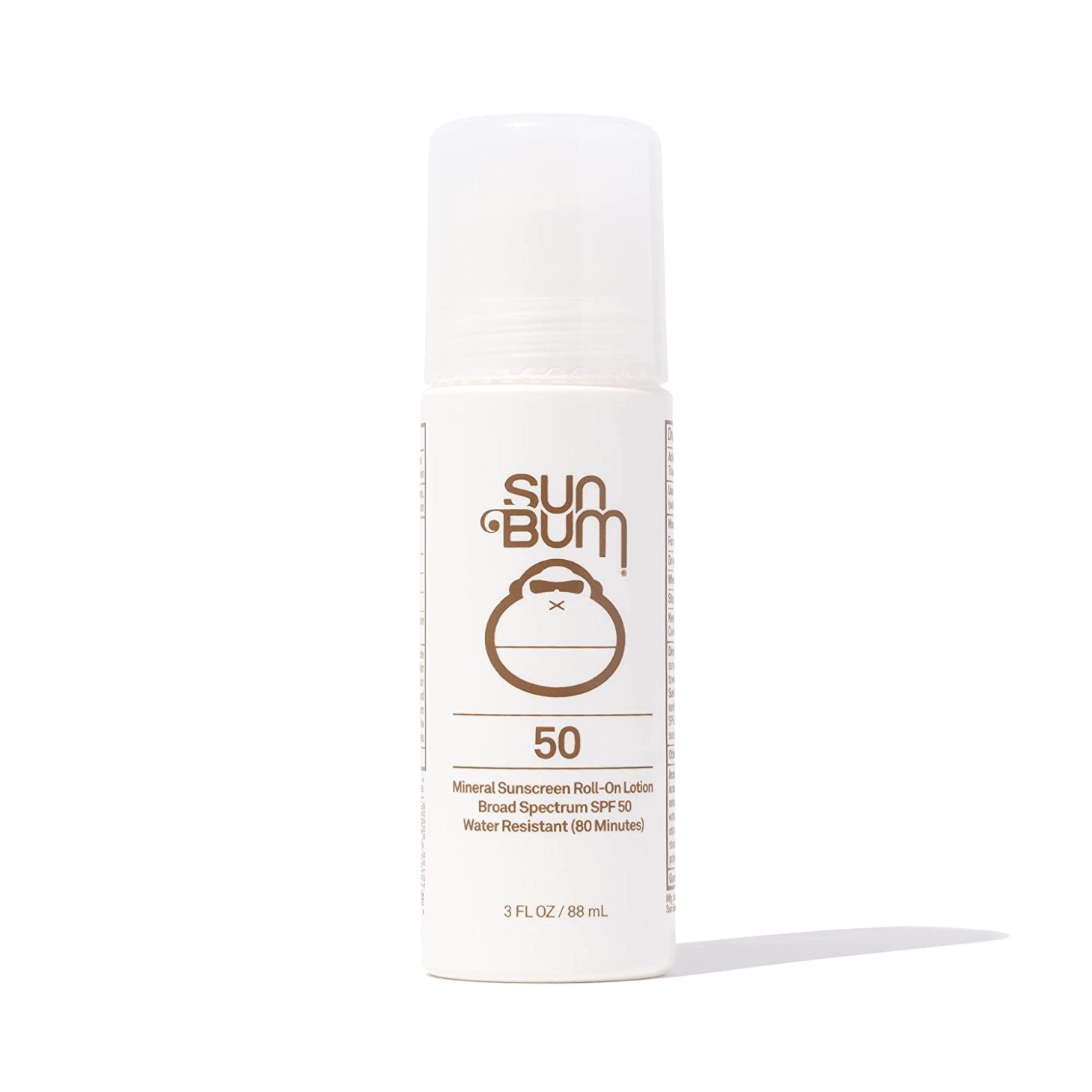
Made with zinc oxide and free from chemicals like formaldehyde, oxybenzone, parabens, octinoxate, silicones, and more, sensitive-skin peeps will love this mineral sunscreen as long as they don’t mind a subtle white tint. The sunscreen is hypoallergenic and fragrance-free, the roll-on application makes for an easier, less messy way to get some sun protection quickly when you head outside.
SPF level: 50
Type: Mineral
Active ingredients: Zinc oxide, titanium oxide
Pros:
- Roll-on application is less messy
- Fragrance-free
- Lightweight and non-greasy
Cons:
- May leave a white cast

A great choice for people with eczema and delicate skin, this mineral sunscreen contains titanium dioxide and zinc oxide, plus three essential ceramides that help hydrate the skin and restore the barrier. It’s oil and fragrance-free, non-comedogenic, and boasts recommendations from both the Skin Cancer Foundation and National Eczema Association.
SPF level: 50
Type: Mineral
Active ingredients: Titanium dioxide, zinc oxide
Pros:
- Contains ceramides to restore skin barrier
- Contains hyaluronic acid to moisturize skin
- Dermatologist developed
Cons:
- May leave a white cast
<!– –>
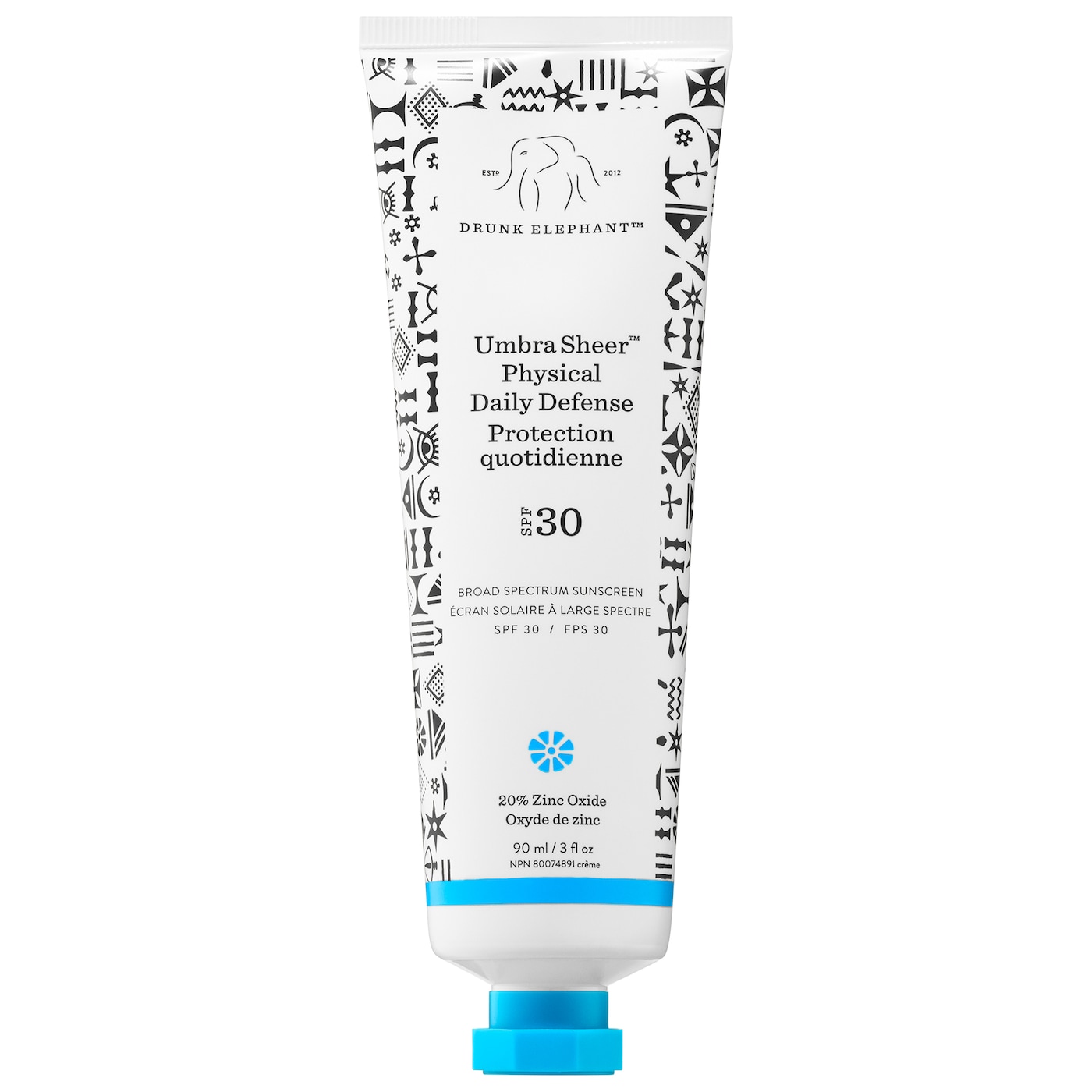
Drunk Elephant’s beloved sunscreen contains no chemical screens or silicones. Instead, it uses zinc oxide to protect skin from UV damage, so it’s the perfect choice for anyone whose skin is prone to irritation. It goes on sheer, which makes it great for everyday use. Plus, it contains antioxidants such as sunflower shoot extract, algae extract, and raspberry seed oil to help protect your skin against damaging environmental factors.
SPF level: 30
Type: Mineral
Active ingredients: Zinc oxide
Pros:
- Sheer finish
- Contains antioxidants
- Fragrance-free
Cons:
- Heavier formula

This hypoallergenic sunscreen from Neutrogena is formulated for sensitive skin types and it’s widely available at most drugstores, too. It’s oil-free, lightweight, and non-greasy and has no fragrance, oils, or harsh chemical ingredients. It’s also water-resistant for up to 80 minutes, so you can use it at the pool or beach.
SPF level: 60+
Type: Mineral
Active ingredients: Titanium oxide, zinc oxide
Pros:
- Oil and fragrance-free
- Water-resistant
- Easy to find at stores
Cons:
- May leave a white cast

This is another affordable sunscreen option that was specifically designed for those with sensitive skin. It’s water and sweat-resistant, so whether you’re going for a swim or out on a hike, you’ll stay protected for up to 80 minutes. Irritation-free and formulated using naturally-sourced zinc oxide active ingredient, this sunscreen absorbs quickly, and stays put for up to 80 minutes. It’s also unscented.
SPF level: 50
Type: Mineral
Active ingredients: Zinc oxide
Pros:
- Lightweight
- Sweat- and water-resistant
- Unscented
Cons:
- May leave a white cast
<!– –>

CoTz stands for “contains only titanium and zinc,” and the brand uses no chemical filters. Dr. Audrey Kunin, a dermatologist and founder of DERMAdoctor, recommends this reef-friendly mineral sunscreen, especially for people with sensitive skin. It has no parabens, fragrances, oils, or preservatives and blends nicely into the skin. It has 20 percent zinc oxide, but many reviewers say it leaves a minimal white cast for a mineral sunscreen.
SPF level: 60
Type: Mineral
Active ingredients: Zinc oxide
Pros:
- Minimal white cast
- Water-resistant
- No dyes, fragrances, or oils
Cons:
- May feel greasy
Frequently asked questions
Is sensitive skin more at risk of sun damage?
Unfortunately, sensitive skin is more at risk of sun damage. “Sensitive skin has a weakened barrier and is more delicate and more prone to damage from any exogenous aggressor,” board-certified dermatologist Trisha Khanna, MD, explains.
When your skin barrier is already compromised, you’re more at risk. For instance, if your skin is on the drier side, creating flaky and cracked skin, the sun can cause even more dryness. Those who have acne-prone skin are also susceptible to further breakouts. Thus, it’s imperative to slather on sunscreen early and often.
Which is better for sensitive skin—sunscreen or sunblock?
“Sunblock is better for sensitive skin because it sits on top of the skin and reflects the UV rays versus absorbing them,” Dr. Khanna says. Sunblock, unlike sunscreen, will physically prevent the UV rays from penetrating the skin—serving as a barrier.
Most skin types will tolerate sunblock due to the fact that it isn’t made with chemical ingredients that may lead to skin irritation, which is exactly what those with sensitive skin should gravitate towards. Using a sunscreen that’s made with chemical ingredients can only create more skin sensitivity for those who struggle with sensitive skin and skin irritation when using sunscreen.
What can I use if I am allergic to sunscreen?
When it comes to being allergic to sunscreen, Dr. Khanna suggests trying out sunblock (not sunscreen) that is specially formulated for sensitive skin. It’s also important to check the ingredients, as it’s likely the allergy isn’t due to the sunscreen itself, but to a fragrance, preservative, UV absorber, or one of the various other components of your product. Because there are so many chemical sunscreens made with these possible irritants, Dr. Khanna recommends opting for a mineral-based sunblock.
